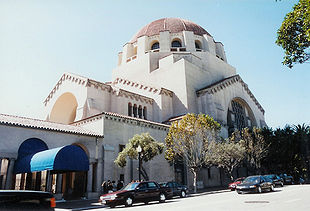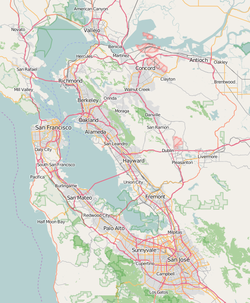Congregation Emanu-El (San Francisco)
| Temple Emanu-El | |
|---|---|
 The synagogue building, in 1999 | |
| Religion | |
| Affiliation | Reform Judaism |
| Ecclesiastical or organisational status | Synagogue |
| Leadership |
|
| Status | Active |
| Location | |
| Location | 2 Lake Street, San Francisco, California 94118 |
| Country | United States |
Location in San Francisco Bay Area, California | |
| Geographic coordinates | 37°47′14″N 122°27′35″W / 37.7872°N 122.4597°W |
| Architecture | |
| Architect(s) | Arthur Brown Jr. |
| Type | Synagogue architecture |
| Style | Byzantine Revival |
| Date established | 1851 (as a congregation) |
| Completed | 1926 |
| Specifications | |
| Dome(s) | One |
| Dome height (outer) | 150 feet (46 m) |
| Website | |
| emanuelsf | |
Congregation Emanu-El is a Reform Jewish congregation and synagogue, located at 2 Lake Street, in San Francisco, California, in the United States. Founded in 1850, the congregation is one of the two oldest Jewish congregations in California, and one of the largest Jewish congregations in the United States. A member of the Union for Reform Judaism, Congregation Emanu-El is a significant[clarification needed] gathering place for the Bay Area Jewish community.
History[edit]




During the Gold Rush in 1849, a small group of Jews held the first High Holy Days services in a tent in San Francisco; it was the first Jewish service on the West Coast of the United States.[1] This group of traders and merchants founded Congregation Emanu-El sometime in 1850, and its charter was issued in April, 1851. The 16 signatories were mostly German Jews from Bavaria.
In 1860, Reform rabbi Elkan Cohn joined the Emanu-El congregation; in 1877, he led the congregation as the first in the West to join the Reform movement.[1] As the Reform movement spread in the United States during the early twentieth century, the synagogue became affiliated with this framework.
In 1884 Julie Rosewald became America's first female cantor when she began serving in Emanu-El, although she was not ordained; and served as cantor until 1893.[2][3]
Among its major programs today,[when?] the congregation includes worship, youth and adult education programs, and also a major emphasis on social justice.[4]
Rabbinical leaders[edit]
This section needs additional citations for verification. (January 2024) |
The following individuals have served as senior rabbi of Congregation Emanu-El:
| Ordinal | Officeholder | Term start | Term end | Time in office | Notes |
|---|---|---|---|---|---|
| 1 | Julius Eckman | 1854 | 1855 | 0–1 years | |
| 2 | Elkan Cohn | 1860 | 1889 | 28–29 years | [1] |
| 3 | Jacob Voorsanger | 1889 | 1908 | 18–19 years | |
| 4 | Martin A. Meyer | 1910 | 1923 | 12–13 years | |
| 5 | Louis Israel Newman | 1924 | 1930 | 5–6 years | |
| 6 | Irving Reichert | 1930 | 1948 | 17–18 years | |
| 7 | Alvin Fine | 1948 | 1964 | 15–16 years | |
| 8 | Meyer Heller | 1950 | 1963 | 12–13 years | |
| 9 | Irving Hausman | 1964 | 1967 | 2–3 years | |
| 10 | Joseph Asher | 1967 | 1986 | 18–19 years | [5] |
| 11 | Robert Kirschner | 1981 | 1992 | 10–11 years | Senior rabbi from 1986 |
| 12 | Dr. Stephen Pearce | 1992 | 2013 | 20–21 years | Senior Rabbi Emeritus since 2013 |
| 13 | Beth Singer | 2013 | incumbent | 10–11 years | Spouses |
| Jonathan Singer |
In addition, the following rabbis currently serve in supporting roles in the congregation: Sydney Mintz (Associate, since 1997), Lawrence Kushner (Scholar in Residence, since 2002), Ryan Bauer (Associate, since 2007), Jason Rodich, (since 2015), and Sarah Joselow Parris (since 2019). The following rabbis have served in supporting roles, yet are no longer in current roles in the congregation: Mark Schiftan (from 1987 until 1994), Peretz Wolf-Prusan (from 1990 until 2010), Helen Cohn (from 1993 until 205), Jonathan Jaffe (from 2007 until 2014), and Carla Fenves (from 2011 until 2020).
Notable members[edit]
This section needs additional citations for verification. (January 2024) |
- Larry Baer
- Jim Bennett, father of Naftali Bennett, the 13rd Prime Minister of Israel
- Joseph Brandenstein
- Stephen Breyer
- Lazarus Dinkelspiel
- Dianne Feinstein[1]
- Donald Fisher
- Doris F. Fisher
- Aaron Fleishhacker
- Richard Goldman
- Rhoda Haas Goldman
- Evelyn Danzig Haas
- Peter E. Haas
- Walter A. Haas Jr.
- Warren Hellman
- Florence Prag Kahn
- Simon Koshland
- Philip N. Lilienthal
- Bob Lurie
- Isaac Magnin
- Raphael Peixotto
- Julie Rosewald
- Nell Sinton
- Douglas W. Shorenstein
- Theodore Solomons
- David Stern
- Levi Strauss[1]
References[edit]
- ^ a b c d e "Emanu-El's pedigree: a towering presence". J. October 8, 1999. Retrieved February 3, 2023.
- ^ "Julie Rosewald: America's first woman cantor". jwa.org.
- ^ "The Forgotten Woman Cantor: Julie Rosewald Now Getting Her Due". The Jewish Week. Archived from the original on May 14, 2016. Retrieved September 15, 2014.
- ^ "Tikkun Tikvah - Working to Reform California's Criminal Justice System". Congregation Emanu-El. Retrieved October 18, 2016.[self-published source?]
- ^ Kirschner, Robert (1991). "A Singular Elegance". In Rischin, Moses; Asher, Raphael (eds.). The Jewish legacy and the German conscience. Berkeley, CA: The Judah L. Magnes Museum. p. 47.
Further reading[edit]
- Rosenbaum, Fred (2000). Visions of Reform : Congregation Emanu-El and the Jews of San Francisco 1849–1999. Judah L. Magnes Museum. ISBN 978-0-943376-69-1.
- Rosenbaum, Fred (1980). Architects of reform: congregational and community leadership Emanu-El of San Francisco, 1849–1980. Western Jewish History Center, Judah L. Magnes Memorial Museum.
- Voorsanger, Jacob (1900). The Chronicles of Emanu-El. Spaulding Press.
External links[edit]
- 1851 establishments in California
- 1920s architecture in the United States
- 20th-century synagogues in the United States
- Arthur Brown Jr. buildings
- Byzantine Revival architecture in California
- Byzantine Revival synagogues
- German-American culture in California
- German-Jewish culture in the United States
- Jewish organizations established in 1851
- Mediterranean Revival architecture in California
- Reform synagogues in California
- Synagogue buildings with domes
- Synagogues completed in 1926
- Synagogues in San Francisco

